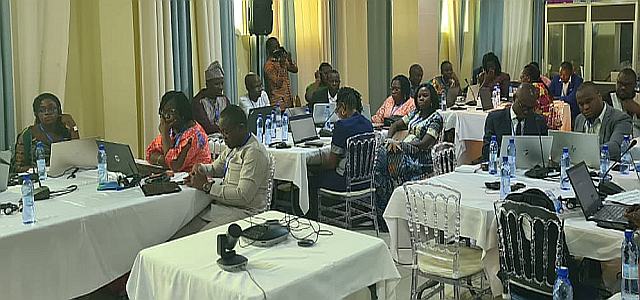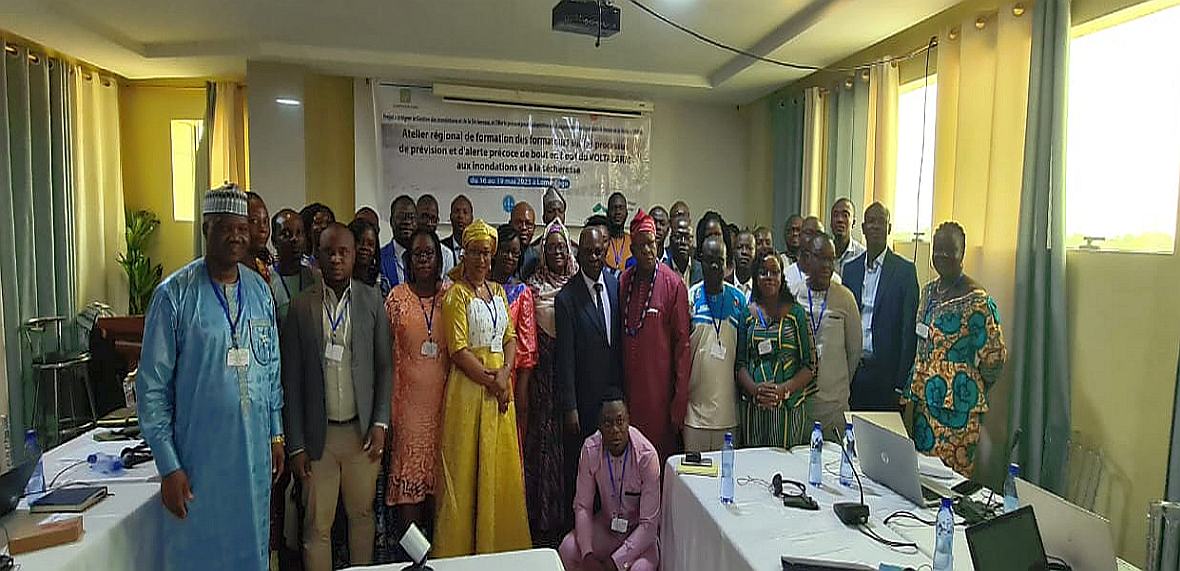 This training programme is aimed at professionals from the six countries (Benin, Burkina Faso, Côte d'Ivoire, Ghana, Mali and Togo) of the basin and at the regional level, providers of hydrometeorological services (National Meteorological and Hydrological Services - NMHSs -, international/regional and research organizations) and users (in charge of civil protection, disaster risk management, water resources management and other various related disciplines) of the VOLTALARM end-to-end flood and drought forecasting and early warning processes. VOLTALARM is the Volta Basin-wide flood and drought forecasting and early warning platform being developed as part of the implementation of the VFDM Project.
This training programme is aimed at professionals from the six countries (Benin, Burkina Faso, Côte d'Ivoire, Ghana, Mali and Togo) of the basin and at the regional level, providers of hydrometeorological services (National Meteorological and Hydrological Services - NMHSs -, international/regional and research organizations) and users (in charge of civil protection, disaster risk management, water resources management and other various related disciplines) of the VOLTALARM end-to-end flood and drought forecasting and early warning processes. VOLTALARM is the Volta Basin-wide flood and drought forecasting and early warning platform being developed as part of the implementation of the VFDM Project.
Five (5) online courses, administered between September 2021 and April 2023, built the capacity of nearly 500 technical staff at different levels of responsibility in the VBA countries. The courses cover all stages of the end-to-end flood forecasting and early warning process as well as integrated drought management (forecasting, monitoring and early warning).
 It is in the spirit of sustainability that the regional training workshop in Lomé, which starts on 16 May 2023, "comes to crown" the five distance learning courses. The regional training of trainers workshop aims to "consolidate the knowledge base acquired by the participants in the VFDM training programme by enabling them to have a harmonised understanding of the key concepts of forecasting, early warning, flooding and drought, and to deepen their knowledge of the different components of the end-to-end flood and drought forecasting and early warning processes. It is also about empowering each participant to better play his or her role in his or her home structure in terms of setting up and facilitating an efficient and operational coordination and collaboration mechanism between the different agencies of the end-to-end flood and drought forecasting and early warning processes in the Volta Basin", says Mr. K. Armand HOUANYE, Executive Secretary of GWP-WA.
It is in the spirit of sustainability that the regional training workshop in Lomé, which starts on 16 May 2023, "comes to crown" the five distance learning courses. The regional training of trainers workshop aims to "consolidate the knowledge base acquired by the participants in the VFDM training programme by enabling them to have a harmonised understanding of the key concepts of forecasting, early warning, flooding and drought, and to deepen their knowledge of the different components of the end-to-end flood and drought forecasting and early warning processes. It is also about empowering each participant to better play his or her role in his or her home structure in terms of setting up and facilitating an efficient and operational coordination and collaboration mechanism between the different agencies of the end-to-end flood and drought forecasting and early warning processes in the Volta Basin", says Mr. K. Armand HOUANYE, Executive Secretary of GWP-WA.
 Among the thirty or so participants taking part in this regional training workshop are professionals from approximately each country in the basin who have passed the knowledge assessments made at the end of each of the five (05) online courses organised. In addition to these professionals, there will be two representatives of the VBA Volta Basin Observatory, the trainers and the VFDM Project management team. This is why the Director of Cabinet representing the Minister of Water and Village Hydraulics said "I am proud and happy to see so many participants with diverse profiles from different structures involved in climate risk management. This encourages me to believe that the training will be of a high standard, with the result that the trainers will be well enriched in the end-to-end SAP approach to flood and drought management.
Among the thirty or so participants taking part in this regional training workshop are professionals from approximately each country in the basin who have passed the knowledge assessments made at the end of each of the five (05) online courses organised. In addition to these professionals, there will be two representatives of the VBA Volta Basin Observatory, the trainers and the VFDM Project management team. This is why the Director of Cabinet representing the Minister of Water and Village Hydraulics said "I am proud and happy to see so many participants with diverse profiles from different structures involved in climate risk management. This encourages me to believe that the training will be of a high standard, with the result that the trainers will be well enriched in the end-to-end SAP approach to flood and drought management.
The Executive Director of the VBA, for his part, "urges their participants to give their best for the effective appropriation of the key tools and concepts of forecasting, early warning and management of floods and droughts in the Volta Basin.
The duration of the training is four days and ends on 19 May 2023. The official launching ceremony is placed under the patronage of the Minister of Water and Village Hydraulics represented by his Director of Cabinet with the effective presence of the Executive Director of VBA and the Executive Secretary of GWP-WA.

